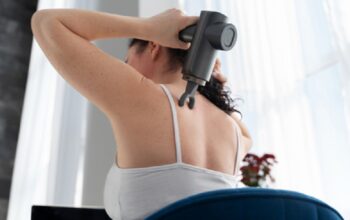Wearable biosensors are transforming healthcare by enabling real-time tracking of hormone levels. These devices help people understand hormonal fluctuations that affect overall well-being. Continuous hormone monitoring allows users to make informed lifestyle and health decisions. Recent technological advancements make wearable biosensors more accurate and accessible. This innovation enhances personalized healthcare by addressing specific metabolic and endocrine challenges. Understanding this technology can empower individuals to improve their health outcomes.
Understanding Wearable Biosensors
Wearable biosensors are compact devices designed to track health metrics continuously. These devices use advanced technology to measure biological data like hormone levels. Key components include sensors, data processors, and wireless transmitters. They work by detecting specific biomarkers in bodily fluids such as sweat, saliva, or interstitial fluid. Recent innovations allow for non-invasive measurements without the need for blood samples. This convenience makes wearable biosensors more appealing to users seeking real-time health insights.
Recent Breakthroughs in Hormone Monitoring
Continuous glucose monitoring systems now track metabolic health with incredible accuracy. Sweat analysis sensors detect key biomarkers non-invasively, offering a comfortable user experience. A study published in the Journal of Materials Chemistry B highlights the development of flexible electrochemical biosensors for non-invasive sweat analysis. Saliva-based biosensors monitor hormones like cortisol and progesterone, offering valuable insights. These advancements provide real-time data that was previously unavailable outside clinical settings. The developments enhance health management for stress, fertility, and metabolic conditions. Wearable technology is becoming a cornerstone of personalized healthcare.
The Science Behind Hormone Monitoring
Hormones regulate vital processes like metabolism, mood, and reproductive health. Accurate monitoring is essential because hormone levels fluctuate throughout the day. Traditional testing methods can miss these critical variations. Wearable biosensors fill this gap by providing continuous, real-time tracking. Research published in Biosensors discusses the accuracy and advancements in wearable devices for hormone tracking. These devices use advanced technology to detect and analyze biomarkers instantly. This approach allows users to understand their hormonal patterns in unprecedented detail.
Technological Innovations Driving Progress
Flexible electronics enable wearable biosensors to fit comfortably on the skin, enhancing user experience. Research from Nano Research highlights the development of flexible and stretchable biosensors for medical diagnostics and therapy. Wireless communication allows seamless data transfer to smartphones or other devices. Energy-harvesting technologies power sensors without frequent recharging. Integration with artificial intelligence enables personalized insights and predictive analytics. These innovations make wearable biosensors more user-friendly and efficient. The advancements ensure the devices are reliable, practical, and accessible for daily use.
Applications in Personalized Healthcare
Wearable biosensors help manage chronic conditions by tracking key hormones like cortisol and insulin. Wearable biosensors track key hormones like cortisol and insulin, aiding in personalized healthcare. Real-time data aids in stress management by identifying triggers and suggesting interventions. Fertility monitoring becomes easier with precise tracking of reproductive hormone levels. Menopause management benefits from tracking hormonal changes during transitional phases. Personalized healthcare ensures users receive targeted insights for improved health outcomes. These devices are reshaping how people approach their overall well-being.
3 Practical Tips
- Select a wearable biosensor designed specifically for your health goals, like stress or fertility tracking.
- Regularly update your device’s software to ensure accurate data and optimized performance.
- Use the data to create actionable health plans with guidance from a healthcare professional.
Ethical and Privacy Considerations
Continuous monitoring raises concerns about data security and privacy. Users must ensure devices protect their personal health information. Developers should prioritize ethical practices to maintain user trust. Transparent communication about data usage builds confidence in the technology. Balancing innovation with responsible practices safeguards users while promoting progress. Addressing these issues is critical for widespread adoption of wearable biosensors.
Frequently Asked Questions (FAQ)
How accurate are wearable biosensors in hormone monitoring?
Wearable biosensors provide reliable data for most users, as supported by recent studies.
Can wearable devices replace traditional diagnostic methods?
Wearable biosensors complement traditional tests by providing continuous insights. They cannot replace clinical diagnostics entirely.
What is the cost of wearable biosensors for hormone tracking?
Costs vary widely, depending on the technology and features. Researching affordable options ensures better access.
Are wearable biosensors suitable for all age groups?
Most devices work well for adults. However, specific devices may suit younger or older users better.
Challenges and Limitations
Wearable biosensors face hurdles like achieving precise measurements under various conditions. Affordability remains a barrier for many potential users. Long-term wearability raises concerns about skin irritation or device durability. Addressing these limitations will make the technology more accessible and effective. Overcoming challenges requires collaboration between researchers, developers, and healthcare providers.
Future Directions in Wearable Biosensors
Future biosensors will integrate AI to provide predictive health analytics. Advances in materials science will improve comfort and sensor durability. Emerging research integrates wearable biosensors with regenerative therapies to enhance recovery and balance. Expanded applications could include fitness, mental health, and environmental monitoring. These developments will enhance the role of wearable biosensors in healthcare. The potential of this technology promises to revolutionize personal health management.
References
Wearable Sensors for Health Monitoring
Wearable sensors are revolutionizing health monitoring by providing continuous, real-time data on various physiological parameters. These devices can detect early signs of infections through changes in heart rate.
Wearable Sensors | National Institutes of Health (NIH)
Advancements in Non-Invasive Female Hormone Monitoring
Researchers have developed a wearable aptamer nanobiosensor capable of non-invasive monitoring of female hormones, such as estradiol, through sweat analysis. This technology offers personalized reproductive health monitoring.
Wearable Biosensors for Personalized Medicine
Advances in wearable biosensors enable continuous monitoring of metabolites and nutrients, providing personalized health insights. These devices can monitor nutrients, hormones, and drugs, offering continuous health monitoring.
New Wearable Sensor Detects Even More Compounds in Human Sweat | Caltech
Development of an Ovulation Biosensor
The National Science Foundation has funded the development of a wearable sensor designed for continuous monitoring of ovulation. This technology aims to provide real-time fertility tracking for women.
SBIR Phase I: Development of an Ovulation Biosensor | National Science Foundation (NSF)





